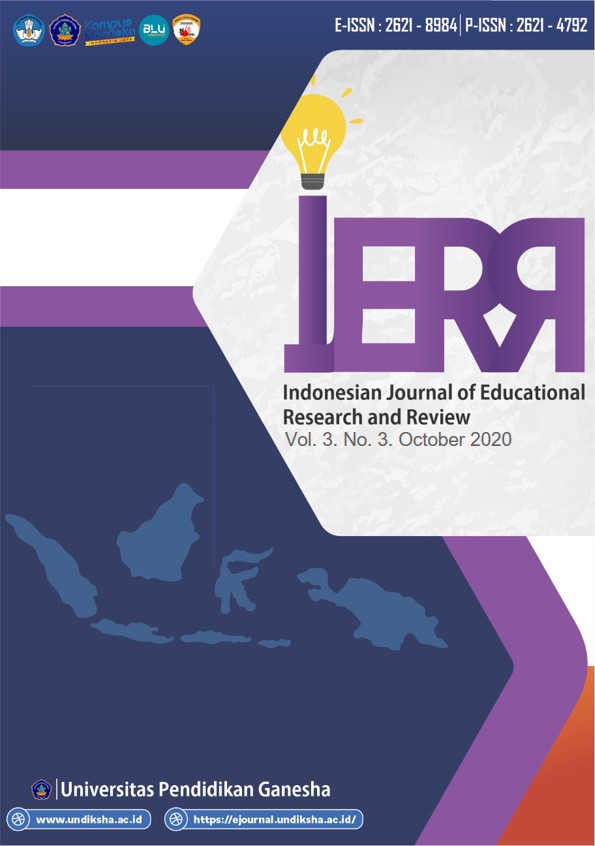Readiness of Biology Education Lecturers to Conduct E-Learning During the Covid-19 Pandemic
DOI:
https://doi.org/10.23887/ijerr.v3i3.30331Keywords:
Kesiapan, E-Learning, DosenAbstract
The purpose of this study is to find out: (1) the readiness qualifications of lecturers doing e-learning in general; (2) qualification of lecturer's e-learning readiness based on readiness factor; (3) qualification of lecturer's readiness based on his birth generation. This research method uses a quantitative descriptive approach, with readiness assessment using the Aydin & Tasci Scale. The respondents were 21 lecturers of private colleges Biology Education in the Bali Region. The results showed: (1) lecturer readiness qualifications for e-learning are generally in the ready category, but need a slight improvement; (2) lecturer's e-learning readiness qualification based on readiness factor entered category is not ready, requires a slight improvement in financial readiness and technological readiness factor. Ready, but it takes a little improvement in sociological readiness, environmental readiness, human resource readiness, and equipment readiness. Ready, this e-learning implementation factor can be continued in psychological readiness and content readiness; and (3) qualifications for lecturer readiness based on their birth generation are in the ready category but need a slight improvement, with the highest readiness score in the baby boomer generation.
References
Anugrahana, A. (2020). Hambatan , Solusi dan Harapan : Pembelajaran Daring Selama Masa Pandemi Covid-19 Oleh Guru Sekolah Dasar. Scholaria: Jurnal Pendidikan Dan Kebudayaan, 10(3), 282–289.
Coopasami, M., Knight, S., & Pete, M. (2017). e-Learning readiness amongst nursing students at the Durban University of Technology. Health SA Gesondheid, 22, 300–306. https://doi.org/10.1016/j.hsag.2017.04.003
De Brouwer, E., Raimondi, D., & Moreau, Y. (2020). Modeling the COVID-19 outbreaks and the effectiveness of the containment measures adopted across countries. MedRxiv, 3, 1–9. https://doi.org/10.1101/2020.04.02.20046375
Hussein, E., Daoud, S., Alrabaiah, H., & Badawi, R. (2020). Exploring undergraduate students’ attitudes towards emergency online learning during COVID-19: A case from the UAE. Children and Youth Services Review, 119(August), 105699. https://doi.org/10.1016/j.childyouth.2020.105699
Mishra, D. L., Gupta, D. T., & Shree, D. A. (2020). Online Teaching-Learning in Higher Education during Lockdown Period of COVID-19 Pandemic. International Journal of Educational Research Open, August, 100012. https://doi.org/10.1016/j.ijedro.2020.100012
Oyedotun, T. D. (2020). Sudden change of pedagogy in education driven by COVID-19: Perspectives and evaluation from a developing country. Research in Globalization, 2(June), 100029. https://doi.org/10.1016/j.resglo.2020.100029
Panesar, K., Dodson, T., Lynch, J., Bryson-Cahn, C., Chew, L., & Dillon, J. (2020). Evolution of COVID-19 Guidelines for University of Washington Oral and Maxillofacial Surgery Patient Care. Journal of Oral and Maxillofacial Surgery, 78(7), 1136–1146. https://doi.org/10.1016/j.joms.2020.04.034
Purwandani, I. (2017). Analisa Tingkat Kesiapan E-Learning (E-Learning Readiness) Studi Kasus: AMIK Bina Sarana Informatika Jakarta. Bianglala Informatika, 5(2), 102–107. https://doi.org/10.31294/bi.v5i2.2976
Ramadan, R., Pradnyana, I. M. A., & Suyasa, P. W. A. (2019). Pengukuran Tingkat Kesiapan Implementasi E-Learning (E-Learning Readiness) Di Sma N 2 Singaraja Menggunakan Model Chapnick. Jurnal Pendidikan Teknologi Dan Kejuruan, 16(2), 258. https://doi.org/10.23887/jptk-undiksha.v16i2.18683
Remuzzi, A., & Remuzzi, G. (2020). COVID-19 and Italy: what next? The Lancet, 395(10231), 1225–1228. https://doi.org/10.1016/S0140-6736(20)30627-9
Rohayani, A. H. H., Kurniabudi, & Sharipuddin. (2015). A Literature Review: Readiness Factors to Measuring e-Learning Readiness in Higher Education. Procedia Computer Science, 59(Iccsci), 230–234. https://doi.org/10.1016/j.procs.2015.07.564
Sugiyono. (2016). Metode Penelitian Kualitatif, Kuantitatif, dan R&D. Alfabeta.
Waryanto, N. H., & Insani, N. (2013). Tingkat Kesiapan (Readiness) Implementasi E-Learning Di Sekolah Menengah Atas Kota Yogyakarta. Jurnal Pendidikan Matematika Dan Sains, 1(2), 117–124. https://doi.org/https://doi.org/10.21831/jpms.v2i2.2478
Yilmaz, R. (2017). Exploring the role of e-learning readiness on student satisfaction and motivation in flipped classroom. Computers in Human Behavior, 70, 251–260. https://doi.org/10.1016/j.chb.2016.12.085
Downloads
Published
How to Cite
Issue
Section
License
Authors who publish with the Indonesian Journal of Educational Research and Review (IJERR) agree to the following terms:
- Authors retain copyright and grant the journal the right of first publication with the work simultaneously licensed under a Creative Commons Attribution License (CC BY-SA 4.0) that allows others to share the work with an acknowledgment of the work's authorship and initial publication in this journal.
- Authors are able to enter into separate, additional contractual arrangements for the non-exclusive distribution of the journal's published version of the work (e.g., post it to an institutional repository or publish it in a book), with an acknowledgment of its initial publication in this journal.
- Authors are permitted and encouraged to post their work online (e.g., in institutional repositories or on their website) prior to and during the submission process, as it can lead to productive exchanges, as well as earlier and greater citation of published work. (See The Effect of Open Access)












